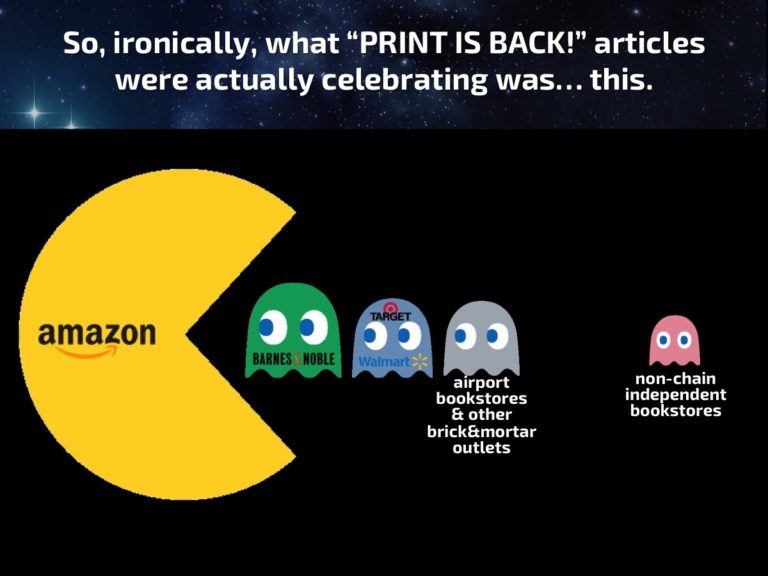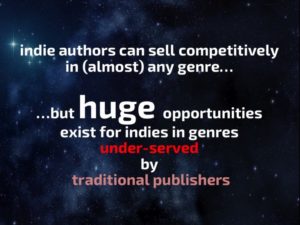“Print is Back!”
Print is not dead. At least, that’s what the headlines say as they report a 3.3% increase in US print sales in 2016.
But are the headlines telling the whole story?
 Not according to Author Earnings, who say the reason print sales increased in 2016 was mostly because of aggressive discounting from Amazon … which leads to print books from major trade publishers costing about the same as the ebook versions (which a lawsuit says Amazon are not allowed to discount).
Not according to Author Earnings, who say the reason print sales increased in 2016 was mostly because of aggressive discounting from Amazon … which leads to print books from major trade publishers costing about the same as the ebook versions (which a lawsuit says Amazon are not allowed to discount).
I prefer ebooks for novels, but I’m still reluctant to pay USD 9.99 for a computer file. I’m happy to pay that or a little more for a paperback which I can easily loan to friends, and can donate to the church library or charity booksale if I no longer want it. But not for an ebook.
Other highlights from the report:
- Sales of adult fiction from traditional publishers are nearly half digital (either audiobooks or ebooks), almost all of which are online sales.
- Print sales actually decreased in large book chains. The only increases were for independent bookstores (a 5% increase), and Amazon (a 15% increase). Another win for online.
- Ebook sales aren’t shrinking. Ebook sales from traditional publishers are shrinking, because Amazon started discounting print instead.
- Sales of ebooks from independent publishers and Amazon imprints remain high.
- The publishing industry typically tracks sales using ISBNs, but many indie publishers choose not to use ISBNs (which are free in Canada and New Zealand, but not in countries like Australia or the US).
On Amazon, 43% of ebooks sold don’t have ISBNs, so aren’t being tracked (well, except by Amazon. And Author Earnings. And individual indie authors).
Overall, the picture is of rising online sales in adult fiction and non-fiction: 69% of US book sales were online. Of those:
- 91% were digital purchases
- 52% were from non-traditional publishers
So the question isn’t paperback or ebook. It’s online or in store. And online is winning.
Adult titles are more likely to sell online than young adult and children’s titles. And fiction is more likely to sell online than non-fiction.
An exception:
It won’t surprise any Christian to know that religious non-fiction and Bibles are one of the biggest areas where we still buy from traditional publishers. This makes sense. I don’t know about you, but while I’m happy to try a novel or devotional from an indie published author, I want my Bible translation to have the backing of a major publisher.
The other genres where traditional publishers have retained online market share include reference books, biography/memoir, self-help, textbooks, and thriller/suspense novels. None of those surprise me: most are genres I’d expect people to prefer to buy in paper.
Data Guy says:
I don’t think Christian fiction is underserved by traditional publishers. But I do think traditional publishers have a skew towards conservative titles, and a growing number of titles which are “clean” rather than Christian. Agree or not, Christian agent Chip MacGregor sees the CBA moving further in this direction.
Please try not to laugh at “declining indie sales” in #8, and focus on #10, where Chip says:
CBA fiction is going to morph into “clean romance” and “values fiction” and “apocalyptic biblical thrillers” aimed specifically at a shrinking group of hard-core conservative evangelical readers in their 50’s. There are only a handful of houses still acquiring Christian fiction these days, and some of them are shifting to doing high-quality literary or women’s stories for a broader people of faith, or a slim list of suspense novels, rather than clearly religious stories aimed only at the faithful.
I don’t know whether to agree or disagree, whether to laugh or cry. What do you think?

